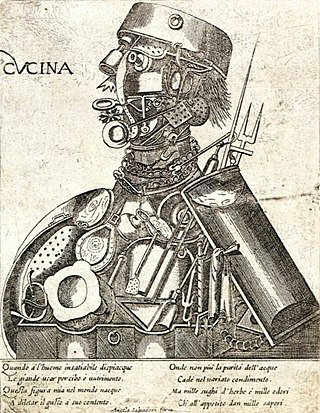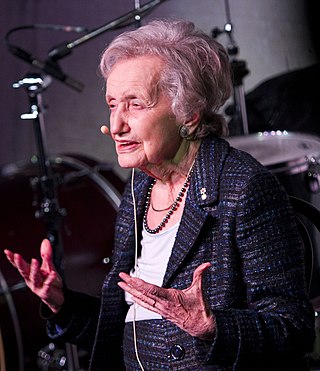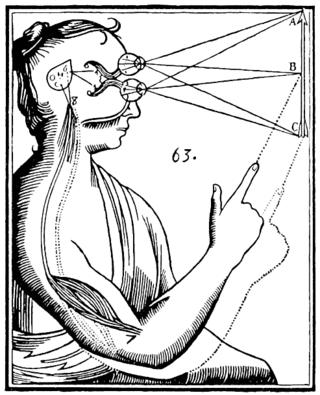Related Research Articles

Consciousness, at its simplest, is awareness of internal and external existence. However, its nature has led to millennia of analyses, explanations, and debate by philosophers, scientists, and theologians. Opinions differ about what exactly needs to be studied or even considered consciousness. In some explanations, it is synonymous with the mind, and at other times, an aspect of it. In the past, it was one's "inner life", the world of introspection, of private thought, imagination, and volition. Today, it often includes any kind of cognition, experience, feeling, or perception. It may be awareness, awareness of awareness, metacognition, or self-awareness, either continuously changing or not. The disparate range of research, notions and speculations raises a curiosity about whether the right questions are being asked.

Neuroscience is the scientific study of the nervous system, its functions, and its disorders. It is a multidisciplinary science that combines physiology, anatomy, molecular biology, developmental biology, cytology, psychology, physics, computer science, chemistry, medicine, statistics, and mathematical modeling to understand the fundamental and emergent properties of neurons, glia and neural circuits. The understanding of the biological basis of learning, memory, behavior, perception, and consciousness has been described by Eric Kandel as the "epic challenge" of the biological sciences.

Mind uploading is a speculative process of whole brain emulation in which a brain scan is used to completely emulate the mental state of the individual in a digital computer. The computer would then run a simulation of the brain's information processing, such that it would respond in essentially the same way as the original brain and experience having a sentient conscious mind.
The neuroscience of religion, also known as neurotheology, and as spiritual neuroscience, attempts to explain religious experience and behaviour in neuroscientific terms. It is the study of correlations of neural phenomena with subjective experiences of spirituality and hypotheses to explain these phenomena. This contrasts with the psychology of religion which studies mental, rather than neural states.

Brenda Milner is a British-Canadian neuropsychologist who has contributed extensively to the research literature on various topics in the field of clinical neuropsychology. Milner is a professor in the Department of Neurology and Neurosurgery at McGill University and a professor of Psychology at the Montreal Neurological Institute. As of 2020, she holds more than 25 honorary degrees and she continued to work in her nineties. Her current work covers many aspects of neuropsychology including her lifelong interest in the involvement of the temporal lobes in episodic memory. She is sometimes referred to as the founder of neuropsychology and has been essential in its development. She received the Balzan Prize for Cognitive Neuroscience in 2009, and the Kavli Prize in Neuroscience, together with John O'Keefe, and Marcus E. Raichle, in 2014. She turned 100 in July 2018 and at the time was still overseeing the work of researchers.

In the philosophy of mind, the hard problem of consciousness is to explain why and how humans and other organisms have qualia, phenomenal consciousness, or subjective experience. It is contrasted with the "easy problems" of explaining why and how physical systems give a (healthy) human being the ability to discriminate, to integrate information, and to perform behavioral functions such as watching, listening, speaking, and so forth. The easy problems are amenable to functional explanation—that is, explanations that are mechanistic or behavioral—since each physical system can be explained purely by reference to the "structure and dynamics" that underpin the phenomenon.

A neuroscientist is a scientist who has specialised knowledge in neuroscience, a branch of biology that deals with the physiology, biochemistry, psychology, anatomy and molecular biology of neurons, neural circuits, and glial cells and especially their behavioral, biological, and psychological aspect in health and disease.

Christof Koch is a German-American neurophysiologist and computational neuroscientist best known for his work on the neural basis of consciousness. He was the president and chief scientist of the Allen Institute for Brain Science in Seattle. He remains at the Institute as a Meritorious Investigator. He is also the Chief Scientist of the Tiny Blue Dot Foundation in Santa Monica, that funds research meant to alleviate suffering, anxiety and other forms of distress in all people.

A psychedelic experience is a temporary altered state of consciousness induced by the consumption of a psychedelic substance. For example, an acid trip is a psychedelic experience brought on by the use of LSD, while a mushroom trip is a psychedelic experience brought on by the use of psilocybin. Psychedelic experiences feature alterations in normal perception such as visual distortions and a subjective loss of self-identity, sometimes interpreted as mystical experiences. Psychedelic experiences lack predictability, as they can range from being highly pleasurable to frightening. The outcome of a psychedelic experience is heavily influenced by the person's mood, personality, expectations, and environment.
A religious experience is a subjective experience which is interpreted within a religious framework. The concept originated in the 19th century, as a defense against the growing rationalism of Western society. William James popularised the concept. In some religions, this is said to sometimes result in unverified personal gnosis.
Neuroinformatics is the emergent field that combines informatics and neuroscience. Neuroinformatics is related with neuroscience data and information processing by artificial neural networks. There are three main directions where neuroinformatics has to be applied:
Scholarly approaches to mysticism include typologies of mysticism and the explanation of mystical states. Since the 19th century, mystical experience has evolved as a distinctive concept. It is closely related to mysticism but lays sole emphasis on the experiential aspect, be it spontaneous or induced by human behavior, whereas mysticism encompasses a broad range of practices aiming at a transformation of the person, not just inducing mystical experiences.

Christopher Donald Frith FRS, FMedSci, FBA, FAAAS is a British psychologist and professor emeritus at the Wellcome Centre for Neuroimaging at University College London. He is also an affiliated research worker at the Interacting Minds Centre at Aarhus University, an honorary Research Fellow at the Institute of Philosophy and a Quondam Fellow of All Souls College, Oxford.

The mind–body problem is a philosophical problem concerning the relationship between thought and consciousness in the human mind and body.
Andrew Newberg is an American neuroscientist who is a professor in the Department of Integrative Medicine and Nutritional Sciences and the director of research at the Marcus Institute of Integrative Health at Thomas Jefferson University Hospital, previously an adjunct professor of religious studies and a lecturer in psychology in the Biological Basis of Behavior Program at the University of Pennsylvania.

John O'Keefe, is an American-British neuroscientist, psychologist and a professor at the Sainsbury Wellcome Centre for Neural Circuits and Behaviour and the Research Department of Cell and Developmental Biology at University College London. He discovered place cells in the hippocampus, and that they show a specific kind of temporal coding in the form of theta phase precession. He shared the Nobel Prize in Physiology or Medicine in 2014, together with May-Britt Moser and Edvard Moser; he has received several other awards. He has worked at University College London for his entire career, but also held a part-time chair at the Norwegian University of Science and Technology at the behest of his Norwegian collaborators, the Mosers.
Eternal oblivion is the philosophical, religious, or scientific concept of one's consciousness forever ceasing upon death. Pamela Health and Jon Klimo write that this concept is mostly associated with religious skepticism, secular humanism, nihilism, agnosticism, and atheism. According to most modern neuroscience theories of consciousness, the brain is the basis of subjective experience, agency, self-awareness, and awareness of the surrounding natural world. When brain death occurs, all brain function forever ceases.

The Princeton Neuroscience Institute (PNI) is a center for neuroscience research at Princeton University. Founded in the spring of 2004, the PNI serves as a "stimulus for teaching and research in neuroscience and related fields" and "places particular emphasis on the close connection between theory, modeling, and experimentation using the most advanced technologies." It often partners with Princeton University's departments of Psychology and Molecular Biology.

The Institut Suisse des Sciences Noétiques or ISSNOE is an established public utility nonprofit foundation dedicated to the scientific and comparative study of consciousness. The institute's research focuses on altered states of consciousness (ASC), like near-death experiences (NDEs), extrasensory perceptions (ESPs), and out-of-body experiences (OBEs).
Denyse O'Leary is a Canadian author, blogger and freelance journalist. She is an advocate of mind-body dualism and the pseudoscientific concept of intelligent design.
References
- ↑ "Mario Beauregard". VIAF. Retrieved 2 November 2016.
- 1 2 "Biography". drmariobeauregard.com. 2012-03-02. Retrieved 2 November 2016.
- ↑ Brean, Joseph (20 September 2013). "Brain science turns to skepticism: As neuroscience's funding and influence grows, so do doubts over its hype". National Post. Retrieved 2 November 2016.
- 1 2 Peterson, Daniel (6 February 2014). "Defending the Faith: Mind and brain: Identical or distinct?". Deseret News. Archived from the original on November 3, 2016. Retrieved 2 November 2016.
- ↑ Beauregard, M (2008). "The emerging field of spiritual neuroscience: An interview with Mario Beauregard, PhD. Interview by Sheldon Lewis". Advances in Mind-Body Medicine. 23 (1): 20–3. PMID 20664137.
- ↑ Beauregard, M; Paquette, V (25 September 2006). "Neural correlates of a mystical experience in Carmelite nuns". Neuroscience Letters. 405 (3): 186–90. doi:10.1016/j.neulet.2006.06.060. PMID 16872743. S2CID 13563460.
- ↑ Highfield, Roger (30 August 2006). "Nuns prove God is not figment of the mind". The Telegraph. Retrieved 2 November 2016.
- ↑ "A mystical union". The Economist. 4 March 2004. Retrieved 2 November 2016.
- ↑ Hagerty, Barbara Bradley (22 May 2009). "Decoding The Mystery Of Near-Death Experiences". NPR. Retrieved 2 November 2016.
- ↑ Walach, Harald (December 2008). "The spiritual brain: a neuroscientist's case for the existence of the soul, By Mario Beauregard and Denyse O'Leary, New York: HarperOne, 2007, ISBN 978-0-06-085883-4, 368 pages" (PDF). Spirituality and Health International. 9 (4): 312–313. doi: 10.1002/shi.364 .